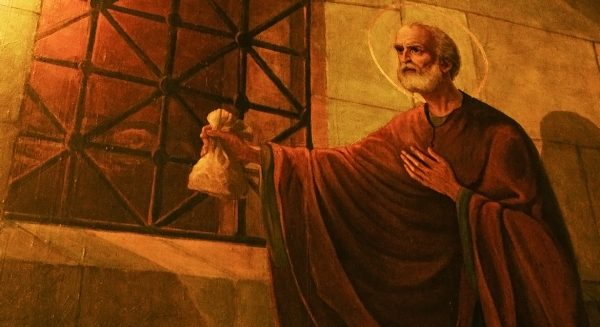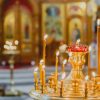In the name of the Father and of the Son and of the Holy Spirit. Amen.
Happy Saint Nicholas Day! It’s beginning to look a bit like Christmas. We’re getting there, aren’t we? We’re getting there. It’s coming soon and celebrating the memory of Saint Nicholas is always a part of the Nativity season as we get ready to celebrate Christmas, the Nativity of Christ, our Savior, we always before that celebrate the memory of Saint Nicholas. And all of us are very familiar with the things that Saint Nicholas did that are the most easy to remember, the most fun to remember and the most related to Christmas. When we think about giving presents at Christmas, we think a lot about Saint Nicholas. He snuck around and he did good deeds. He did good deeds and he got caught a few times.
That’s how we know that he did it. That’s how we know that he helped people. But the most of the time, when Saint Nicholas was doing good deeds, he was trying very hard to make them secret good deeds. When he snuck into somebody’s house and left little bags of gold for them or did a good deed like that, he was trying to do it usually secretly so that nobody would know. And there’s an amazing blessing, and some of you have already heard me talk about this this week in catechism and other places, but there’s an amazing grace from God, a spiritual experience to be had by doing secret good deeds.
It might sound sort of silly even, or like we would be embarrassed to go out and pretend that we were Santa Claus. Wouldn’t that be silly to pretend that you were Santa Claus? But when we look at Saint Nicholas as the real Santa Claus as the saint who followed Christ and the saint that we are supposed to imitate as well, we see that one of the incredible things he did was secret good deeds. And if you haven’t ever actually done a secret good deed, go do one. And with you young students, I’ve talked to you before about bringing a little bag of candy to school and sneaking pieces into people’s pockets or their desks or their lunch bags. And then it’s okay, I give you my blessing to pretend like you didn’t do it. Whoa, you got a piece of candy. Wow, where’d that come from? That’s wonderful.
And I told you the story about the person one time who came to me and confessed that they had stolen some money and I told them that as their penance, as their solving or healing that little sin of stealing, they had to go sneak the money back into the person’s pocket or their purse or something. And that person actually fell in love in doing that penance. And it took them awhile to find a time and a place to sneak the money back to the person that they had stolen it from. But they actually fell in love with doing secret good deeds. And afterwards they would go around, and they love just putting $5 in somebody’s pocket when they weren’t looking and then watching them reach in their pocket and go, “I found money in my pocket!” We all like that, don’t we? We all like that.
And not only is it joyful, but it brings a special grace into our life when we do secret good deeds, because we have the joy of seeing the person blessed and joyful at the thing that we have done and not tempted to be proud about it ourselves, to not think that we are special because we did a special good deed, and it really is a wonderful innocent thing to experience.
And so particularly during this Nativity season, this Nativity fast, look for an opportunity to do a secret good deed. All of you, no matter what age you are, figure out if you’re at home and you’re a kid, take the garbage out without being asked and then say, “Whoa, that’s amazing how’d that happen? The garbage angel must have come.” Right? Or get a present for somebody and get it delivered to them without them knowing who it came from. Do a secret good deed. And I promise you, it turns into just a wonderful, incredible joy where you get to participate in someone else’s, just their joy, their happiness, but without any temptation to have the focus on you as being the doer of good deeds. And I’ll tell you, I’ll warn you ahead of time as we see in the life of Saint Nicholas, that if you do secret good deeds, God will let you get caught. He’ll let you get caught after a while because when we do things in secret, God rewards us openly.
One time when we had a big dinner here for raising money for a monastery that we love very much and that you all know, somebody gave a really big secret gift to the monastery and they even asked the Abbess, “Please don’t tell anyone. We just, we don’t want the attention. We don’t need anyone to know. We just, we love you all. We want to support you, but we don’t, we just would like it to be anonymous.” And the Abbess said, “Okay.” And during the dinner, the Abbess was sitting next to me and she leaned over to me and she said, “Father Thaddeus, so-and-so gave us a lot of money and they don’t want anyone to know.”
But God wants everyone to know. And she got up and she announced to the entire crowd at the dinner who had given a lot of money. And you think, as Westerners we struggle with that kind of thing. But think about all of the people, how many times Christ healed people and told them, “Don’t tell anyone that I healed you.” And they went out, it says they went out and immediately began telling everyone what Christ had done.
And that’s the amazing thing about God is He tells us, “Go into your closet and pray and your Father who sees you in secret praying to him will reward you openly.” So it’s another way for us to, the saints call it sanctified self-love, where we actually love ourselves, truly, authentically love ourselves enough, created in the image of God that we do what is good for us. And one of those things that we do is secret good deeds.
But I would also like to point out that the less popular virtues of Saint Nicholas, not because they weren’t worthy of notice, but they’re harder for us to actually embrace. And one of those things is that Saint Nicholas, from his youth, loved God, and he wanted other people to know about God. He went through all sorts of struggle because he loved God and he wouldn’t stop loving God. And he went through all sorts of trouble, persecution, being put in jail because he wouldn’t stop loving God. He would not stop telling people about God and he would not stop defending the truth about God. And a lot of people actually didn’t like him because of that.
You have to remember, all of you, that Saint Nicholas was made a bishop, he was a deacon and then he was a priest. And then he was a bishop before Christianity was even legal. And as a bishop under the last Roman emperors who were against Christianity, as a bishop he was put in prison with his church, because Christianity was illegal. He was in prison telling people about God, defending the truth about God and loving God. He went through a lot of suffering. That’s barely describing all the suffering that he went through, but he would never give up.
And he went through the period of time of Christianity becoming legal and then attending the first Ecumenical Council. And all of you know this wonderful, loving saint who went around and did all kinds of secret good deeds, and yet when he was face to face with a terrible heretic named Arius, he got so upset that Arius was saying horrible things about God, that what did he do? He slapped him in the face. He got in trouble for that by the way. He was actually deposed for a little while. He was stripped of his being a bishop, but then the Mother of God and Christ appeared to the other bishops that were at the First Ecumenical Council and they honored Saint Nicholas and said that what he was defending was the truth and they restored him to being a bishop. So, think about that. A bishop saint who got in so much trouble with his fellow bishops that they actually fired him for a while and he’d already been in jail. A lot of people thought he was a troublemaker. They had even heard that he was sneaking into people’s houses without permission. Isn’t that funny?
In the Gospel reading today, when we hear the section of the Beatitudes, it is talking particularly about good bishops. When it says, blessed are you who are persecuted for my name’s sake, because we count on the bishops standing up for the truth and defending the truth about God and the Church and scripture and the Apostolic succession. We count on the bishops being so unpopular in their love for God and their defense of the truth that people do not like them, and they persecute them. And we see that’s exactly what Saint Nicholas did and fulfilled. So whenever you remember Saint Nicholas putting things in somebody’s stockings, whenever you think about doing a secret good deed, which you should do in order to participate in that particular virtue and feel the grace of it.
Also remember that we can’t ever do a life of good deeds. We can’t ever successfully practice secret good deeds over and over again, unless, first, we give ourselves to loving God, no matter what happens, defending the truth about God, no matter what people think or say about us, and telling people about God, whether it’s popular or unpopular, because that is what makes you a great saint like our Holy Father, Saint Nicholas.
In the name of the Father and of the Son and of the Holy Spirit. Amen.

















